Podcast Beta
Questions and Answers
What is indicated by the repeated phrase in the content?
Which of the following interpretations of the content could indicate a problem?
What could be inferred about the use of the ACE Scanner based on the repeated scans?
What issue could arise from continuously scanning the same document multiple times?
Signup and view all the answers
What is the primary function of the ACE Scanner as implied in the content?
Signup and view all the answers
Study Notes
The History of Computers
- The Abacus was a counting tool used thousands of years ago, considered to be the first mechanical calculating device.
- Blaise Pascal invented the Pascaline in 1642, the first mechanical calculator to perform addition and subtraction.
- Gottfried Wilhelm von Leibniz created a mechanical calculator capable of handling multiplication and division in 1673.
- Charles Babbage (1791-1871) developed the Analytical Engine, considered the first general-purpose computer, but it was never built in his lifetime.
- Ada Lovelace (1815-1852) is considered the first computer programmer, collaborating with Charles Babbage.
- Herman Hollerith (1860-1929) invented the Tabulating Machine in 1884, using punch cards to process information.
Early Computers
- The ENIAC (Electronic Numerical Integrator and Computer) was completed in 1946, considered the first general-purpose electronic computer.
- ENIAC was used to calculate artillery trajectories during World War II and later performed other scientific calculations.
- John von Neumann proposed an architectural design for computers that has been adopted as the basis for most modern computers: the Von Neumann Architecture.
- The EDVAC (Electronic Discrete Variable Automatic Computer) was the first computer to use the Von Neumann architecture.
The Transistor
- The invention of the transistor in 1947 revolutionized computer technology, leading to smaller, faster, and more reliable computers.
The Integrated Circuit (IC)
- The invention of the integrated circuit (IC) in 1958 by Jack Kilby allowed for the miniaturization of electronics. It allowed for the creation of integrated circuits and microchips, laying the foundation for the modern computer age.
The personal computer (PC)
- The personal computer was introduced in the 1970s.
- The first commercially successful personal computers were the Altair 8800 and Apple II.
Microprocessors
- Intel created the first microprocessor in 1971.
- Microprocessors are integrated circuits that can be programmed to perform a wide range of tasks.
- Microprocessors are now found in almost all electronic devices, including computers, smartphones, and appliances.
The internet and World Wide Web
- The Internet emerged in the 1980s as a network of computers that could communicate with each other.
- The World Wide Web was created in the late 1980s and early 1990s.
Modern Computing
- Today, computers are smaller and more powerful than ever before, with a significant impact on society.
- The smartphone is a prime example of how the personal computer has evolved.
- Cloud computing, artificial intelligence, and machine learning are some of the key trends shaping the future of computing.
Studying That Suits You
Use AI to generate personalized quizzes and flashcards to suit your learning preferences.
Related Documents
Description
Test your knowledge on the evolution of computers, starting from ancient tools like the Abacus to modern electronic marvels like the ENIAC. This quiz covers influential figures such as Charles Babbage and Ada Lovelace, detailing their contributions to computing. Perfect for anyone interested in the milestones of technology!




